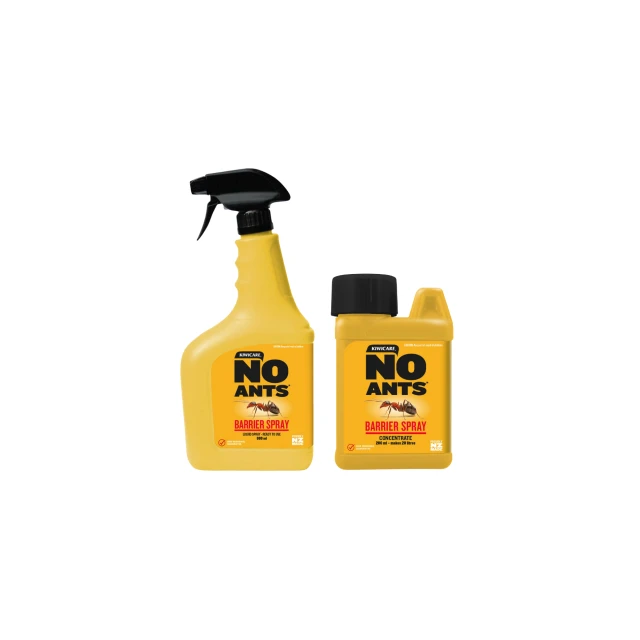Solve problems in and around your home.
Start Problem Solver

Ants are nest forming social insects that can be a nuisance in the garden, some species protect and 'farm' pests such as aphids and scale insects.
Ants in the garden can be more than a nuisance and a source of infestation in the home. Some ant species will attack and remove competing invertebrates from their environment and protect and 'farm' sap-sucking pest insects such as aphids and scale insects. They feed on the honeydew droplets that aphids and scale will produce as waste from their feeding on plant sap.
Ants are social insects, building nests containing many thousands of individuals. The nests are often in warm, dry areas of the garden such as under paving stones, paths, driveways and plant pots. Ants that invade homes in search of food are most often from nests located in the garden.
Control of ants in the garden can be important, both for removing a nuisance and as part of the control of the insect pests such as aphids and scale insects that they 'farm.' Ants protect the aphids and scale so that they can feed on the honeydew that the sap-sucking pests produce.
Flying Ants - Often referred to as alates, ants with wings are the female queen and male ants who grow wings, take the air for a nuptial flight to reproduce and start new colonies. This happens in the form of swarms that can be of significant numbers. Read more about flying ants.
To get rid of ants in the garden follow these simple steps:
The nests of some species will co-operate and can be regarded as a supercolony.
Ant colonies contain at least 3 castes (some have a fourth caste of soldier ants):
Queens > which are fertilised females after the wings are cast off
Males > short-lived often with wings to take part in nuptial flights with females that become queens
Workers > usually sterile females comprising the bulk of the colony.
Foraging workers that you may see out seeking food are usually only about 5% of the colony, so controlling the ants you see with insecticide is only temporary and should only be done after controlling the nest with baits.
Invasive ants such as Argentine ants are more than just a nuisance pest. They are also a threat to New Zealand's biodiversity as they attack and eliminate other insects and invertebrates when they move into a new area. We are at risk of bringing biting ants such as red imported fire ant into New Zealand. There have been three incursions of Fire Ants in New Zealand since 2001 but these have been successfully eradicated by MAF Biosecurity.
As nuisance pests ants can cause electrical and electronic faults when they get into equipment such as electric gates, switchgear, exchanges and computers, they can contaminate foodstuffs, and damage garden plants.
Ant colonies will often combine during Winter and separate again in Summer. During Midsummer - late Autumn, swarms of winged males and females of many species take off on nuptial flights. After their nuptials the ants fall to the ground, the males perish and the fertilised females, now queens, cast their wings and crawl off in search of locations for the establishment of new colonies. Ants evolved from early wasps and the similarity is most noticeable when the ants have wings.
Scientific names of important pest ants in New Zealand:
Some ants 'farm' aphids and scale insects for sweet secretions and it worth treating your plants with suitable garden insecticides to control these sapsucking plant pests and deny the ants their food supply.
LawnPro Lawnguard Granules, LawnPro Protector PLANThealth Insect Hit Granules are useful in areas of garden where ants are a nuisance and as an additional barrier around a house or other building. The prills (granules) are sprinkled onto soil and gravel surfaces where ants are travelling and then watered in to take the insecticide deep into the soil, forming a curtain barrier.
More information on Darwin Ants, Argentine Ants and White Footed Ants.

For effective control of ant colonies and nests. A sugar–based liquid bait perfect for sugar feeding ants.

Extremely effective control by eliminating ants and ant nest sites before they enter your home.

For long–term control of ants in and around buildings.
""The result was much better than that when I hired some pest controllers previously." Firstly, I'd like to thank your company for good advice to get rid of ants from home. I bought the products (both NO ANT GEL BAIT and NO ANT LIQUID BAIT) from Mitre10 and followed that suggestion. The result was much better than that when I hired some pest controllers previously. *But I found some problem. The Gel bait worked perfect. The liquid bait was too strong. Ants just died around the bait area, which made the bait containers shipped with the bait only useful for once or twice. Besides, if ants can not bring back the bait to their nest, there would be less chance that it can kill the queen. I hope the liquit bait can have similar effect to that of gel bait."
Michael